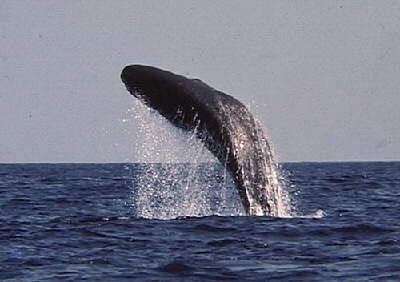Mediterranean…or Deaditerranean?
by Cruising Editor on 13 Aug 2006

Sperm Whale SW
If you like to see the dolphins playing around your bow while sailing, or if you like to throw a line to catch a fish for dinner, then your time could be limited in the Mediterranean. If you think that sea-gulls and other sea birds are a natural part of sailing scene, then you could be disappointed sailing in the Med. - and the lack of sea-birds across these pristine waters may be traceable to the scarcity of fish from which they feed.
Fishing is admitted to be in crisis in Italian, Greek and Croatian waters, and both Greenpeace and the Worldwide Fund for Nature (WWF) have recently warned of coming crises throughout the Mediterranean. Restaurants in Sucuraj, Croatia claim that they have ceased to offer tuna in their menus, because they just can’t get it. A couple of decades ago, there were so many tuna in the Adriatic that tourists used to climb ladders on the shore to watch the schools swim by.
The Herald Tribune recently quoted Simon Cripps, director of the Global Marine Programme at WWF as saying, 'This is past the alarm stage – we are seeing a complete collapse of the tuna population.'
And where have all the fishes gone? – Reports are, to Tokyo, where the Japanese relish the fresh tuna for the delicacies of sushi and sashimi. These, however, come from fish farms, which more and more dominate fishing in the Med.
From one end of the Med to the other, there is plenty of anecdotal evidence:
In the town of Drvenik, in Croatia, where two decades ago there were 120 fishing boats, there are none left. One local ex-fisherman now raises honeybees to survive.
A Greenpeace vessel went out to trail illegal fishing several weeks ago, only to have their trailing ambitions crushed by the fact that the ‘illegal fishermen’ couldn’t find any fish!
In Italy, on the island of Favignana, their Tuna Hunt Festival has not been successful in recent years as there are not enough Tuna for the Hunt.
WHALES AND DOLPHINS:
However, according to Greenpeace, it is illegal driftnet fishing throughout the Mediterranean which is responsible for the killing of scores or whales and dolphins. This type of fishing has long been banned, but it is the implementation of these bans said to be at fault. Greenpeace wants the countries to finally commit to a network of marine reserves to protect the sea’s fish stock.
'If people are horrified by the images of the whales being harpooned in the Southern Ocean, they'd be equally repulsed by the thousands of dolphins and other creatures that are being entangled and killed by fisherman using huge illegal driftnets each season in the Mediterranean,' said Sofia Tsenikli of Greenpeace Greece aboard the Rainbow Warrior.
Greenpeace's flagship the Rainbow Warrior has recently spent the three weeks on the high seas off the coasts of Greece and Italy confronting rogue fishing vessels and confiscating their driftnets, known as 'walls of death', up to 15km in length and 15m deep that are still being used to fish a dwindling stock of swordfish despite United Nations and European Union bans.
Belated round-ups by the Italian authorities over the past 6 months have reportedly captured over 400 km of illegal driftnets from ships which have already received large grants from the EU to change fishing gear since the ban came into effect.
However, international co-operation is needed to tackle illegal fishing, as the Mediterranean is an international sea with 21 coastal states where only five countries and two islands are part of the EU.
If the co-operation is not forthcoming, we might soon be calling this stunningly beautiful waterway the Dediterranean.
If you want to link to this article then please use this URL: www.sail-world.com/26610